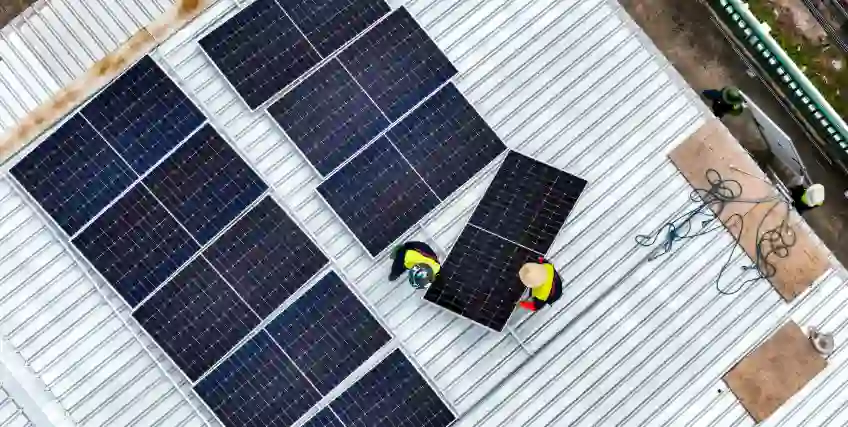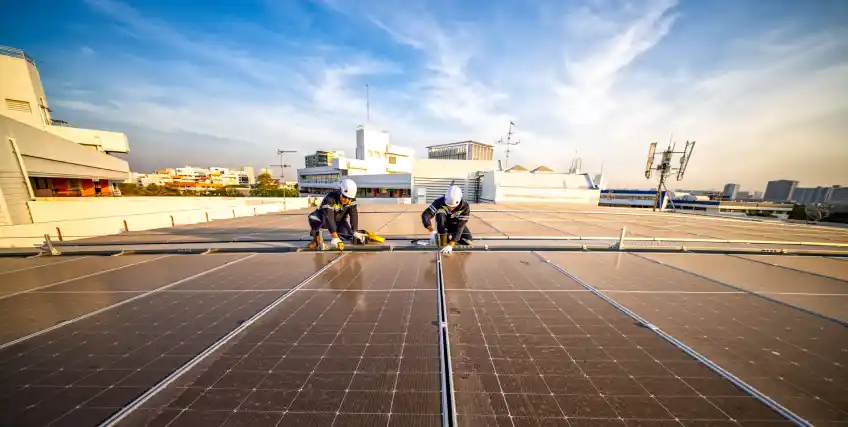Energy Project Loans vs. Grants: Which Is Right for Your Business?
Jul 11, 2025 | Last Updated on: Jul 14, 2025

Renewable energy projects are big business. Globally, the renewable energy market is worth an estimated $1.5 trillion.
After years of rising energy prices and sustainability concerns, more small business owners are exploring financing renewable energy projects to start their own energy businesses, particularly in clean energy and renewable energy sources.
While many are doing it out of concern for the environment, such as reducing emissions and enhancing energy efficiency, some see it as a business opportunity.
If you’ve considered an energy project business, financing renewable energy projects should be at the top of your radar because you’ll need funding to make it happen.
When financing renewable energy projects, you have two basic options. You can get debt financing or a small business loan, or you can try to secure a grant.
Each has its benefits and limitations, and one option may be better for certain types of renewable energy project financing than others.
A small business loan can offer you faster funding and more flexibility to use the funds as you want. Meanwhile, grants can take a while to get approved (if you’re approved at all), and many have restrictions on how you can use the funds. But if you’re fortunate enough to get a grant, it doesn’t have to be paid back.
We’ll explore the differences between financing renewable energy projects through a business loan and grants. We’ll also explain how each works so you can determine which one is right for your business model and goals.
Basics of Financing Renewable Energy Projects
If you’re an entrepreneur thinking about starting an energy or solar project, such as a solar energy installation business or a wind farm project, you’ll need to decide how you’ll fund it. Renewable energy project costs can range from $50,000 to $2 million, depending on the scope of the business. Many business owners start small and expand their revenue stream over time.
No matter what, you’ll need to consider that financing renewable energy projects requires a bit of thought and planning. However, there are two main options for energy project finance: a small business loan or a grant.
Small Business Loans
You can opt for financing renewable energy projects through a business loan from a traditional lender like a commercial bank, credit union, or the Small Business Administration (SBA). Or, you can apply for your loan online through an alternative lender specializing in financing renewable energy projects.
There are several types of small business loans, ranging from commercial real estate loans to term loans and equipment financing.
- Benefits of a Small Business Loan for Financing Renewable Energy Projects
- Easier to get than a grant, especially when financing renewable energy projects that align with green energy incentives and government-backed programs, if you have the credit and criteria needed to qualify
- Builds business credit needed for financing needs down the road
- You retain full ownership of your business
- Potential tax benefits like investment tax credits (ITC) and incentives related to clean energy investments and infrastructure projects
- Can increase your project's viability in the eyes of future lenders, investors, or other stakeholders
- Drawbacks of Small Business Loans
- Credit requirements vary by lender
- You have to repay the loan with interest
- There’s always the risk of default when financing renewable energy projects through a loan, which could damage your business reputation and disrupt cash flow
Grants
A business grant is money from the government, a corporation, a trust, or a foundation. These organizations often provide grants to drive innovation, particularly within a given energy sector such as geothermal, solar power, or energy storage systems.
- Benefits of Grants for Financing Renewable Energy Projects
- It doesn’t have to be repaid
- You don’t have to give up ownership in exchange for getting the grant
- Can improve your business reputation - grants are highly regarded within clean energy communities
- May help reduce the project’s risk when paired with other types of funding, like loans, venture capital, or equity investors who are willing to take on partial ownership in exchange for long-term returns
- Drawbacks of Grants
- Long and exhaustive application process, often several months
- Highly competitive and hard to get
- Restrictions on how you can use the grant and usually come with reporting requirements, especially when financing renewable energy projects, where oversight is stricter to ensure proper allocation of funds
Some grants are also known as matching grants, which means you have to come up with the same amount of money as the grant itself.
But if you can get a full, partial, or matching grant to start your energy project business, it can be the best way toward financing renewable energy projects and achieving your business model goals while minimizing upfront impact on cash flow.
Choosing the Right Funding Option for Financing Renewable Energy Projects
Before you decide between a loan or a grant for financing renewable energy projects, consider your project’s needs, goals, and timelines to choose the best option for your business.
Here are some things to think about:
1. Project Size and Cost
Financing renewable energy projects can result in sizable costs, or the costs might be more manageable. A small project, like a solar installation business using solar PV systems, may not require as much money as building a new facility or installing large-scale wind turbines or energy storage systems.
For smaller energy projects, a small business loan or even a quicker grant might be enough to fund your venture. But a bigger project might require both grants and business loans to get off the ground, particularly if you have less business experience.
The SBA also has a microloan program for loan amounts under $50,000. For smaller clean energy projects, it might be just what you need to get started.
You can also explore nonrecourse financing, where the lender’s only collateral is the project’s assets. This can be especially useful for higher-risk energy ventures.
The bottom line is to consider your needs and the scope of your infrastructure project before deciding which route you’ll take to fund it.
2. Your Business’s Financial Health
Whether you’re expanding from an existing business or starting a new one from scratch, lenders will evaluate your financial health and creditworthiness. Even if you apply for a grant, depending on the organization, many will evaluate your financial health and stability to ensure you’ll manage the funds correctly.
Lenders will look at your business’s income, debt, and credit score. If your business is in good shape financially, it’ll be easier to get a loan from a bank or credit union with fair terms.
If your credit history isn’t great, a grant or a loan with an alternative lender is a better option. Some alternative lenders are more flexible with credit requirements and don’t require higher credit scores.
3. How Quickly You Need the Money
Loans are usually faster than grants, no matter which lender you choose. However, many traditional loans still take months to fund, if you’re approved. Some online lenders may approve and fund a loan faster. Grants often take months, and there's no guarantee you’ll get one.
Tips for Your Energy Project Finance Application
Whether you apply for a small business loan or a grant, preparing for the process is the key to greater success.
Here are some tips to help you apply with greater confidence that your energy project will get the funding it needs.
For Your Energy Project Loan:
- Have a strong business plan. Financial institutions want to see that your project makes sense and that you’ll be able to repay the money while meeting your other debt obligations. Do market research and include those insights. Include financial projections and explain how the project will help your business grow.
- Compare lenders. Some lenders offer special loan programs for green energy projects. Shop around to find the best interest rate and repayment terms you can get, considering your credit credentials. Be sure to read your power purchase agreement (PPA) through to understand the conditions of the loan.
- Consider applying with an online lender. You can apply for a business loan online to save time and compare your financing options. Many sites let you check rates without hurting your credit score. But, ultimately, an online loan works faster than a bank loan.
For Grant Funding:
- Check official websites regularly. There are many online websites dedicated to grant listings. Look at places like grants.gov, the Department of Energy’s small business programs, your state’s energy sector office, or local utility companies for current grant opportunities.
- Consider hiring a grant writer. The application process for grants is overwhelming. A professional grant writer can help you stay organized and improve your chances of winning a grant.
- Understand and follow the rules. Grants often come with conditions. Be ready to track how the money is used and send any required updates or reports as stipulated in your grant contract.
Final Thoughts
Both loans and grants can play a vital role in helping your small business fund its energy projects. Each option has its benefits and drawbacks. A loan can give you faster access and more flexibility to the capital you need to grow your business. But you'll have to repay your loan with interest.
A grant doesn’t need to be paid back, but it can take longer to get if you secure one. There may also be more rules and restrictions for how you can use the grant funds.
There’s no one right choice for every business. The best option depends on the type of energy project business, your business goals, how fast you need the funds, and your overall financial health.
Some businesses find it helpful to combine both a loan and grant funding to get their new energy project off the ground when financing renewable energy projects.
Explore your options online for a grant and research lenders before applying with one. Get a business plan together, then take the steps to move your project forward.
FAQs About Financing Renewable Energy Projects
1. What’s the key difference between an energy loan and a grant?
The primary difference is that a borrower must repay the loan to the lender, while a grant doesn’t have to be repaid, although there are probably stipulations on how the grant funds can be used. Loans usually come from banks, credit unions, or online lenders, while grants usually come from government programs and nonprofit organizations.
2. Is it easier to get debt financing or a grant?
This depends on your credit and business history. For example, most lenders require at least two years of business history to consider a loan, although online lenders have financing solutions for less time in business. There are also fewer options for grants and more people applying for them, so there’s competition.
3. Is financing renewable energy projects possible through both a loan and a grant?
Many businesses combine a grant and a loan to cover the full cost of their project. A grant can help lower the upfront cost, while a loan can fill in the gap so you get your energy project development underway sooner.
4. How long can it take to get approved for a grant?
Grant approval can take several months and is highly competitive, with only about one in 10 grant proposals being accepted. Decision times often depend on the application cycle and how many people are applying.
5. Is it faster to get my energy project financed online than if I apply for a regular business loan through a bank or the SBA?
Online lenders and financing platforms often have faster application and approval times than traditional lenders or grant programs.




